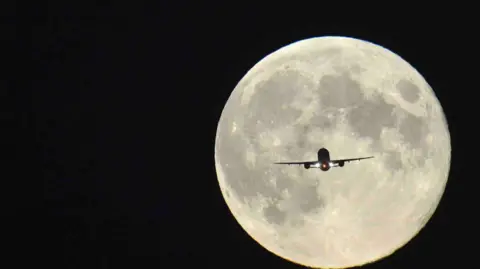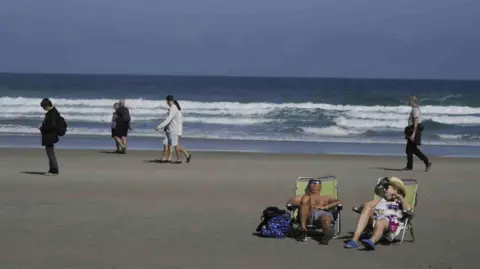Lowest tide 'may never be seen again'
 Reuters
ReutersCoastal engineers are predicting very low tides in the UK later may be the lowest anyone will see again.
A low spring tide caused by the position of the Moon and Sun will create the "exceptionally" low tide, said Exeter-based Moffatt & Nichol.
It said with sea levels rising, such a low tide may never be seen again.
It follows a 2022 report showing sea levels are rising much faster than a century ago.
The Met Office says sea levels are now rising by 3-5.2mm (0.1-0.2in) a year, more than double the rate of increase in the early part of last century.
Coastal engineer Hamish Hall from Moffat & Nichol explained the "exceptionally low tides are caused by an unusual series of events".
The Moon is nearing its furthest position north or south of the equator at the same time as the September equinox when the gravitational pull of both the Sun and Moon align more closely due to the Earth's position.
Mr Hall said: "It's probably another 10 years before we see this type of low tide again.
"With sea level rise projections we may never see this predicted low tide again."
 EPA
EPAHow does the Moon affect tides?
The Moon's most obvious influence is on our tides. Ocean tides are caused by the gravitational pull between the Earth and the Moon. Where oceans face the Moon the water swells and builds up, creating a high tide, in what is called a tidal bulge.
Meanwhile on the opposite side of the planet the Earth is pulled towards the Moon more than the ocean is, which in turn causes another high tide.
As the Moon moves around the planet the tides move with it, causing two high and low tides every day.
Source: BBC Weather
Changes of tides could also be affected by weather and sea swell, said Dr Joanne Williams, sea level researcher at the National Oceanography Centre.
"Such a low tide might happen again but it will be less and less often that it gets down to these levels," she said.
A chart based on Met Office data shows sea levels rising in Exmouth by nearly 0.5m (1.6ft) from 2015 to 2063.
Mr Hall warned people to beware of putting themselves in danger to watch the low tides.
"Don't think that it's all right just to walk out onto a beach because it may not be a beach, it may be littered with debris that could cut you or worse," he said.
Follow BBC Cornwall on X (formerly Twitter), Facebook and Instagram. Follow BBC Devon on X (formerly Twitter), Facebook and Instagram. Send your story ideas to [email protected].
